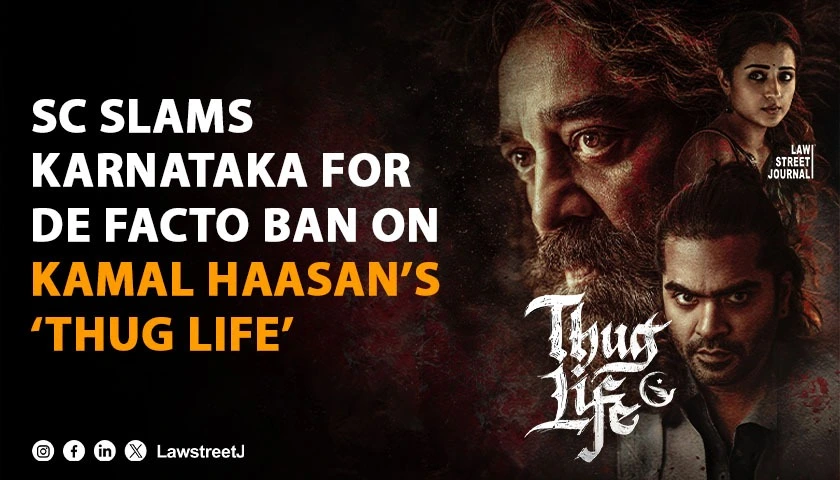NEW DELHI: The Supreme Court on Tuesday questioned Karnataka government's tacit approval for de facto ban on Kamal Haasan's starrer film 'Thug Life' in Karnataka, following his controversial remarks on Kannada language, saying a mob cannot put a gun on theatre owners to prohibit its screening.
"We can't allow mobs and vigilante groups to take over the streets. The rule of law must prevail. We can't allow this to happen. If somebody has made a statement, counter it with a statement. Somebody has made some writing, counter it with some writing. This is proxy (ban)...," a bench of Justices Ujjal Bhuyan and Manmohan said.
The court felt the film should be released in Karnataka and the rule of law cannot be allowed to be held hostage to mob threats, and a gun cannot be put on somebody’s head to force a resolution.
The court made it clear that the release of the film concerns the rule of law and fundamental rights, which requires its intervention, and that is what it is meant for -- “to be a custodian of rule of law, as well as fundamental rights”.
The film got released in cinema halls across the country on June 5. The Tamil movie, which reunites Hassan with filmmaker Mani Ratnam after 1987's "Nayakan", could not be released in Karnataka after Haasan's comments about Kannada language sparked a major controversy.
At the outset, the bench said that mobs and vigilante groups cannot be allowed to take control of the streets and if somebody has made a statement then it should be countered with a statement, and the rule of law must prevail.
The petitioner’s lawyer said the state has not even filed a complaint.
“An urgent notice was issued (in the matter), when will you file your reply....file a reply by tomorrow. We cannot allow it to happen”, the bench asked the counsel, representing the Karnataka government.
The state’s counsel said the producer of the movie had approached the high court.
To this, the bench said it can transfer the matter from the high court to the apex court, and the counsel cannot tell the court that the matter is pending before the high court.
“The rule of law demands that any person should be allowed to release this film, it cannot be the fear of burning down the cinemas that the film (will not be released) …. people may not watch the film. We are not passing an order that please come and watch the film. But the film must be released,” the bench.
The court thus transferred the plea filed by the film’s co-producer from the Karnataka High Court to itself and scheduled the matter on Thursday.
During the hearing, the court said Karnataka is an enlightened state and “it will not allow the mobs to take over”.
The State’s counsel said the producer of the movie moved before the high court and made a statement that the matter will be resolved with the Karnataka Film Chamber of Commerce (KFCC), and till that date he will not release the movie.
The bench said, “Rule of law demands that people can’t be put a gun on their head and made to say that unless you resolve it….”.
The court said that rule of law is important and the state must ensure that anyone who wants to show a film must be released after it gets a CBFC certificate.
“It has a certificate -- it is liable to be screened. That is the law we follow in this country,” the bench said.
A counsel, representing a party opposing the release of the film, contended that sentiments of the people are involved.
“People will not come and see the film. But the film will always be released…it cannot be that because of fear of burning up of cinema halls or because people will say that they will come and do a gherao," the bench said.
The court said recently the apex court passed a judgment in the case of Congress MP Imran Pratapgarhi, who had recited a poem and then an FIR was registered against him.
“In that judgment we have recorded the full bench decision of the Bombay High Court in the 90s authored by Justice D Y Chandrachud. There was a Marathi play Mee Nathuram Godse Boltoy, where there were critical references to the ‘father of the nation’. There was a hue and cry and the Maharashtra government banned the play and directed seizure of all the copies”. “High court intervened and set aside that order. It said that he may be revered as father of the nation. Think of it, father of the nation….but to have a different view you cannot stop it. That is the freedom of speech," the bench said.
A counsel pressed that the producer of the movie said that the solution would be arrived at and the court should allow them to make that effort.
The bench emphasised that any film which has the CBFC certificate should be allowed to be released and the state has to ensure that rule of law prevails.
A counsel, representing an intervenor, contended that the matter is coming up before the high court on June 20, and requested the bench to hear the matter after that.
“There is nothing coming up before the high court now. Everything is here,” the bench said.
"There is something wrong in the system that one person makes a statement and he believes that statement, as if it is gospel truth. Let there be a debate on that issue. Let people say that he is wrong,” the bench said.
The bench said all the enlightened people of Bengaluru can issue a statement that Hassan is wrong and he does not know anything. “Why should the high court say regret and apology? It is not the business of the courts…apology of anybody. Just because he has expressed a view,” the bench said.
The bench pointed out the matter concerns the rule of law and fundamental rights, therefore this court is intervening, and that is what the Supreme Court is meant for, to be a custodian of rule of law, as well as fundamental rights.
“It is not just screening of the film and it is much bigger than,” the bench said.
The court was hearing a plea by M Mahesh Reddy questioning de facto ban on the screening of the CBFC certified film in Karnataka. Advocate A Velan appeared on behalf of the PIL filed by Bengaluru resident.















